The arrival of Antonio Conte and Romelu Lukaku instantly turned Inter into a contender for the Scudetto. They dropped only 5 points in the first 14 games of the season, then began declining significantly in performance in December. Sunday's loss against Lazio is only their second defeat in the league — they lost to Juventus in October — but 5 draws in the last 10 games cost Antonio Conte's team first place in the standings. Looking at the season as a whole, Inter are 2nd in Serie A for non-penalty expected goals (1.59), far from Atalanta (2.21, 1st), but just slightly above Napoli (1.59, 3rd), Juventus (1.58, 4th) and Lazio (1.55, 5th). They are also strong defensively, with the 3rd best defense according to non-penalty goals conceded (0.99), only behind Atalanta (0.96, 2nd) and Juventus (0.85, 1st). Despite the latest results, nothing is absolutely lost, as Juventus only have a three-point advantage and Lazio two points, but while there are still 14 games left to play, the trend is not positive for the Nerazzurri. Inter probably benefited from variance, despite Romelu Lukaku’s and Lautaro Martínez’s observed numbers matching those expected. As a team, their non-penalty goal difference of 0.96 is 1.6 times greater than their non-penalty xG difference of 0.60. 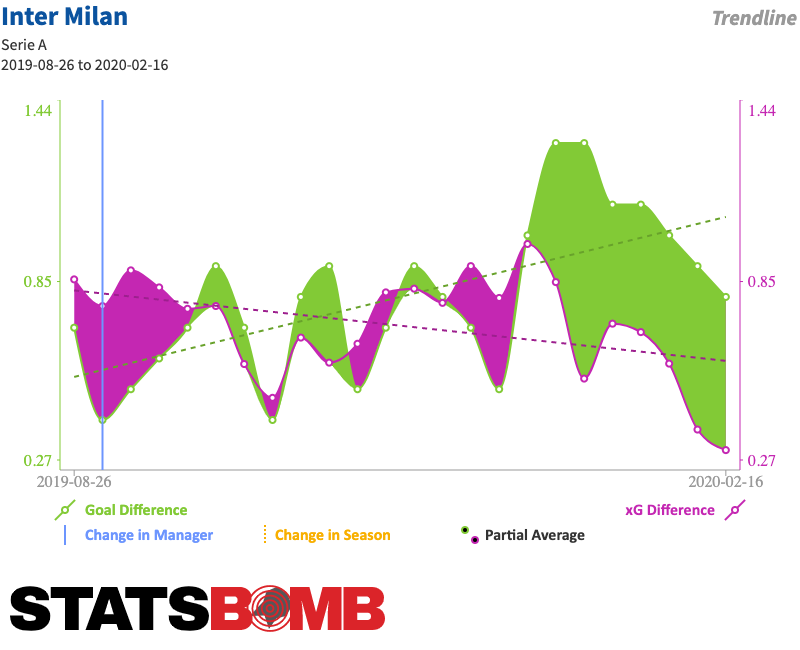 The gap between the two values has been growing since December; Inter managed to maintain a strong goal difference but their non-penalty goal difference collapsed. Excluding penalties, in the last 10 games, they averaged a goal difference of 0.80 but an xG of 0.30. Over the first 14 games, Inter maintained an average non-penalty xG of 1.75 and non-penalty xG conceded of 0.93. In the last 10 games played, offensive production dropped to 1.34 xG, while the defense declined to an average of 1.07 xG conceded.
The gap between the two values has been growing since December; Inter managed to maintain a strong goal difference but their non-penalty goal difference collapsed. Excluding penalties, in the last 10 games, they averaged a goal difference of 0.80 but an xG of 0.30. Over the first 14 games, Inter maintained an average non-penalty xG of 1.75 and non-penalty xG conceded of 0.93. In the last 10 games played, offensive production dropped to 1.34 xG, while the defense declined to an average of 1.07 xG conceded. 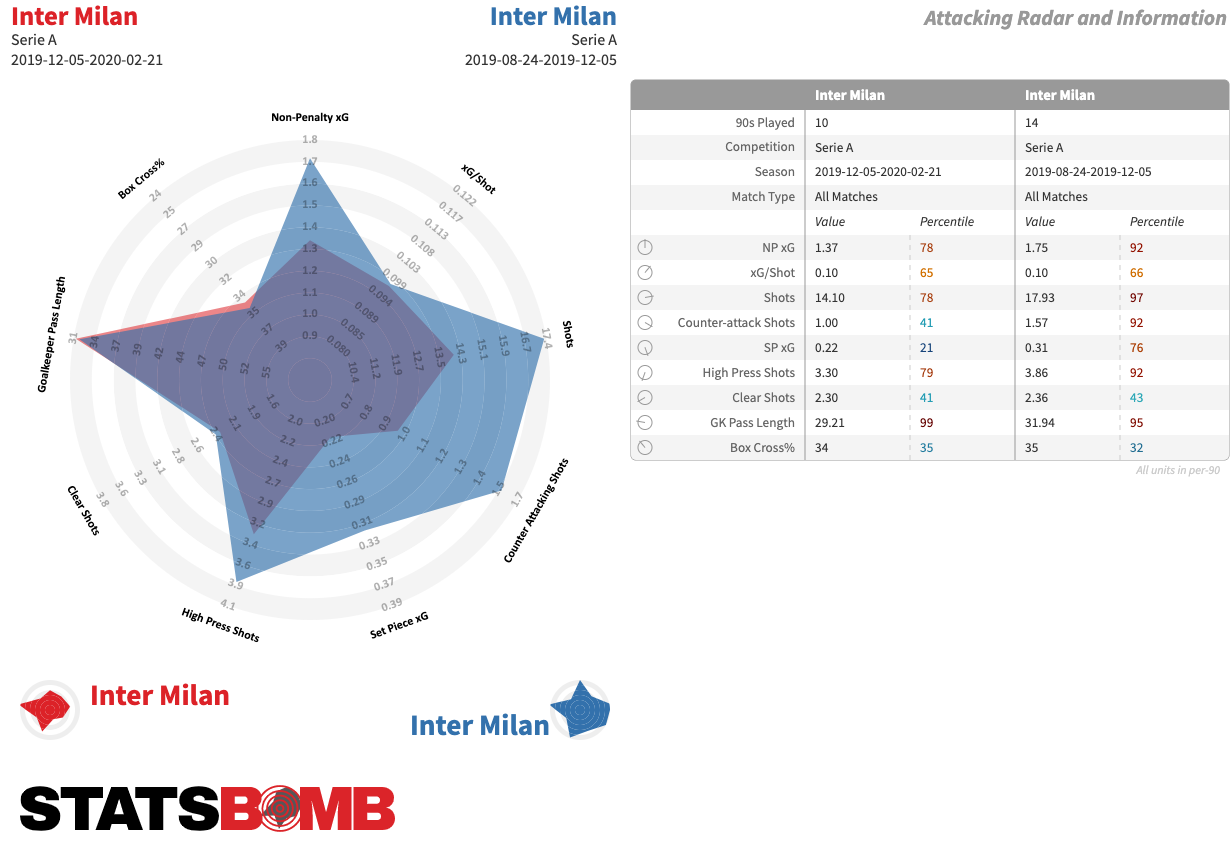 The non-penalty xG difference has therefore dropped by 64% (from 0.82 to 0.30). With their performances now 7th best in the league, it's no wonder they've lost the lead. Inter are also now having difficulty creating chances, as their opponents have found useful strategies to limit them. Inter's offensive game is not highly sophisticated, based on recurring passing patterns and the ability to create chances for its two extraordinary attackers. To give you a concrete example, in an interesting interview with El País' Diego Torres, Atalanta's Papu Gomez explained how they faced Inter:
The non-penalty xG difference has therefore dropped by 64% (from 0.82 to 0.30). With their performances now 7th best in the league, it's no wonder they've lost the lead. Inter are also now having difficulty creating chances, as their opponents have found useful strategies to limit them. Inter's offensive game is not highly sophisticated, based on recurring passing patterns and the ability to create chances for its two extraordinary attackers. To give you a concrete example, in an interesting interview with El País' Diego Torres, Atalanta's Papu Gomez explained how they faced Inter:
Inter had only one move: they played out from the back moving the ball from the center-back to the wing-back, who played a first touch pass to the forwards, Lukaku and Lautaro. One of them was used as a target man, while the other one dropped back to collect the ball, defend it and make his team advance. We man-marked their strikers with our center-backs: we were aware that it was risky, but we also knew that in that way we were able to limit them and create opportunities every time we recovered the ball.
Of their defensive metrics, their aggression coefficient (which measures the proportion of an opponent's passes that are aggressively pressed) dropped from 74th to the 7th percentile) and their passes per defensive action dropped from the 95th to the 34th percentile. 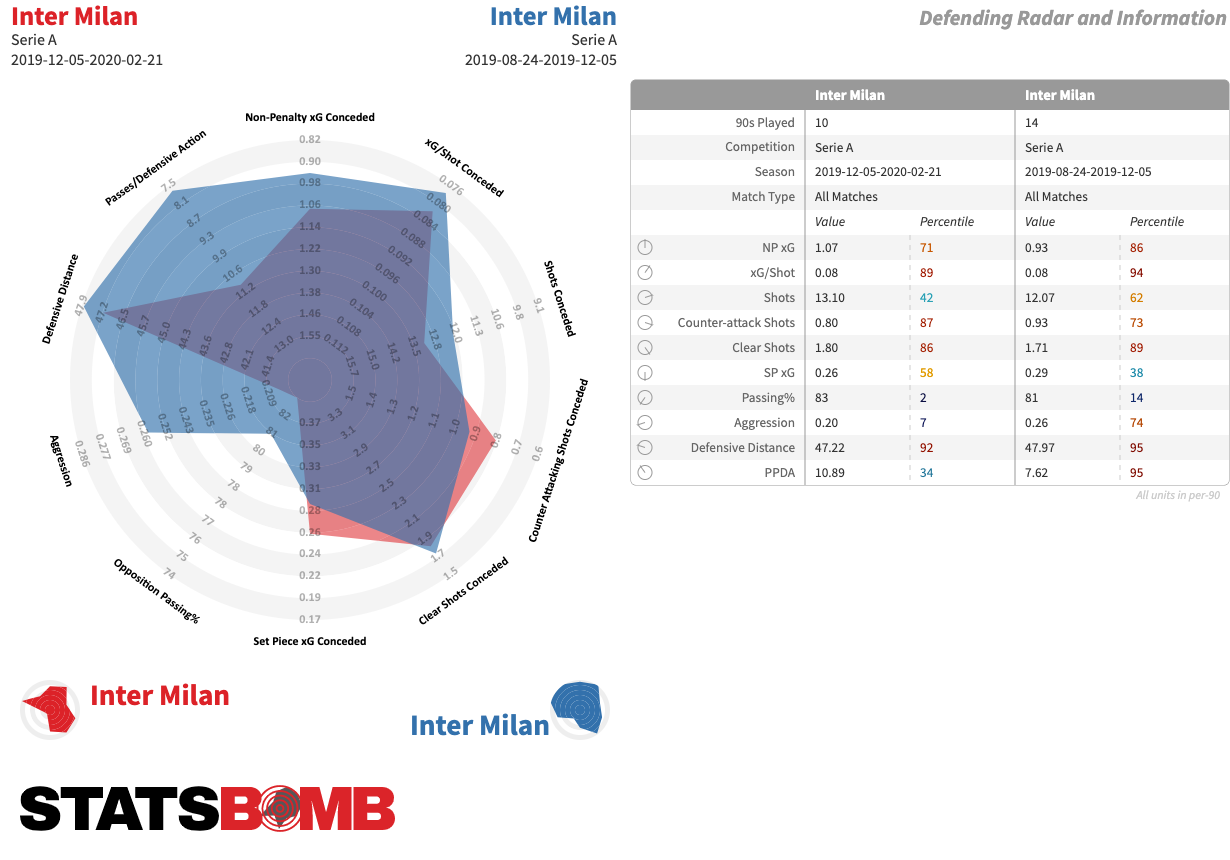 Since December, the decline has been dramatic and Inter, who were among the best teams in the league with a PPDA value of around 7.5, can no longer suppress the opponent's plays as effectively as in the first part of the season. In the last 10 games, their average PPDA was 10.89, a value similar to that of teams struggling not to get relegated, like SPAL and Sampdoria. It's also near that of Lazio, but they have a different style of play, often deliberately trying to leave the ball to their opponents to open up spaces to attack in transition.
Since December, the decline has been dramatic and Inter, who were among the best teams in the league with a PPDA value of around 7.5, can no longer suppress the opponent's plays as effectively as in the first part of the season. In the last 10 games, their average PPDA was 10.89, a value similar to that of teams struggling not to get relegated, like SPAL and Sampdoria. It's also near that of Lazio, but they have a different style of play, often deliberately trying to leave the ball to their opponents to open up spaces to attack in transition. 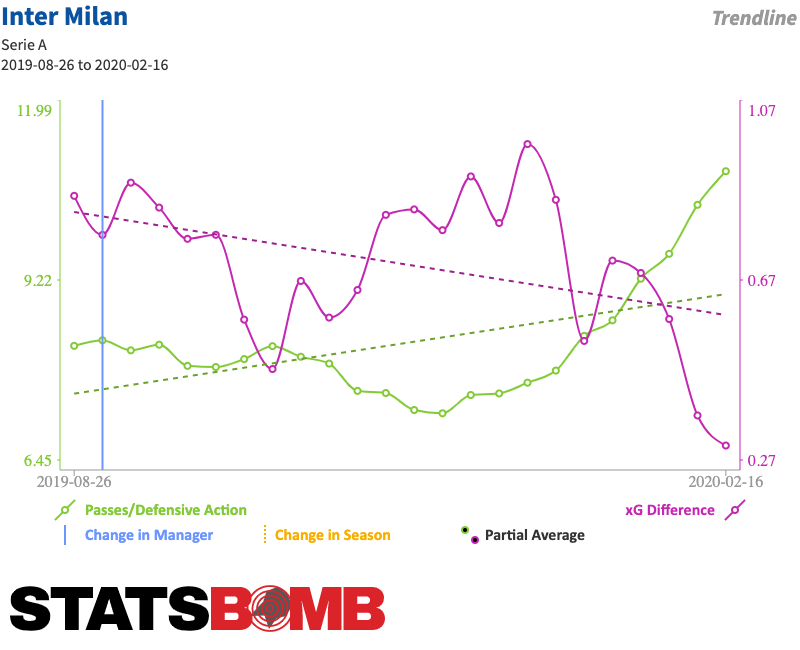 It's not easy to say whether this trend is caused by a different strategic attitude implemented by Conte, considering how many times he's stressed the importance of balancing a roster that in his opinion lacks depth. It could simply the drop of form the manager feared, as 12 players have played about 75% of the total minutes available. The decrease in intensity is easy to see by looking at the last few matches, in which Inter have neither managed to create chances consistently nor to limit their opponents (especially against Lazio), which contrast sharply with their form at the beginning of the season. What matters is that the significant PPDA decline coincides with an equally steep decline in performance as measured once again by non-penalty xG difference. The decline of Marcelo Brozović, who previously looked like an elite performer, is emblematic. The Croatian is no longer able to provide the creativity he offered earlier, nor is he reliable playing as a holding midfielder in front of the defense, as evidenced from the wildly different output in terms of possession adjusted interceptions and tackles.
It's not easy to say whether this trend is caused by a different strategic attitude implemented by Conte, considering how many times he's stressed the importance of balancing a roster that in his opinion lacks depth. It could simply the drop of form the manager feared, as 12 players have played about 75% of the total minutes available. The decrease in intensity is easy to see by looking at the last few matches, in which Inter have neither managed to create chances consistently nor to limit their opponents (especially against Lazio), which contrast sharply with their form at the beginning of the season. What matters is that the significant PPDA decline coincides with an equally steep decline in performance as measured once again by non-penalty xG difference. The decline of Marcelo Brozović, who previously looked like an elite performer, is emblematic. The Croatian is no longer able to provide the creativity he offered earlier, nor is he reliable playing as a holding midfielder in front of the defense, as evidenced from the wildly different output in terms of possession adjusted interceptions and tackles. 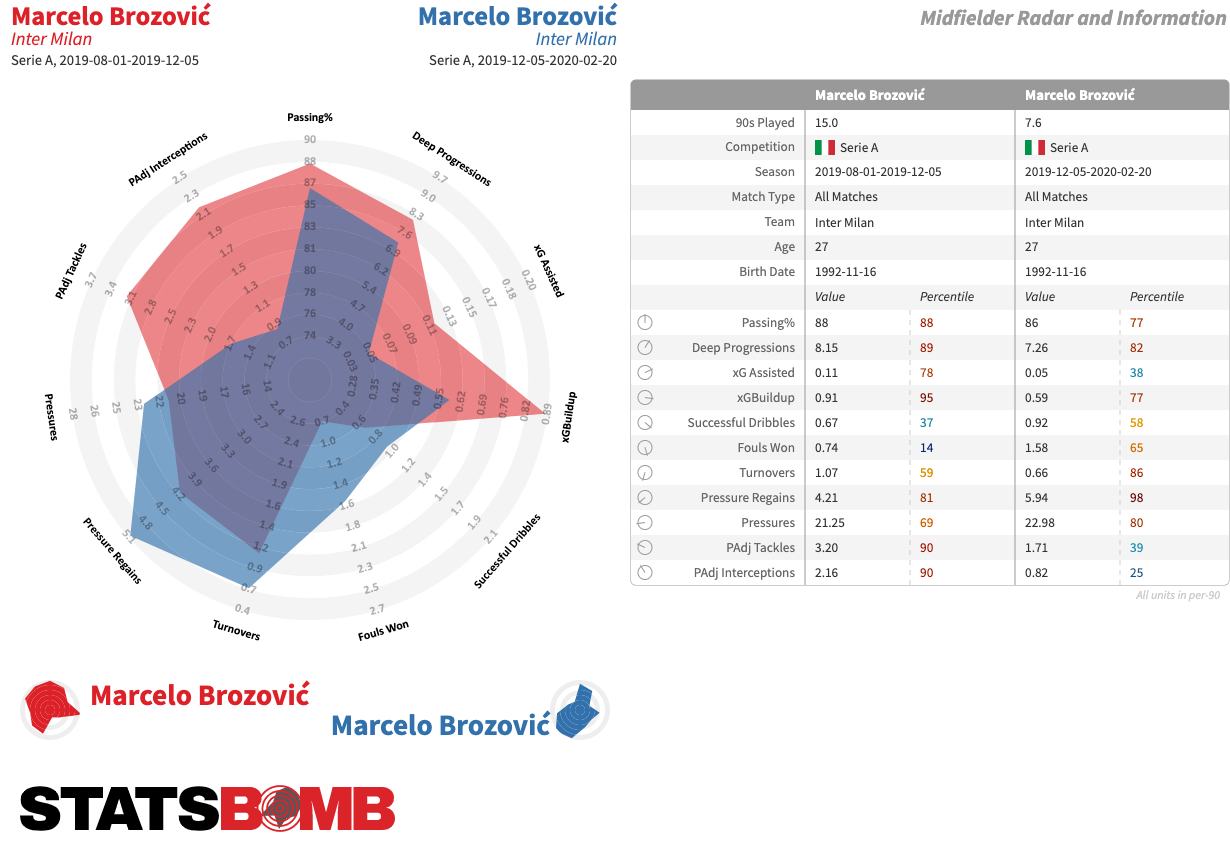 Inter have no alternative but to hope that Brozović will return to his original level of performance and again provide creativity to a stagnating side. Conte is in a tough situation. In addition to going without Samir Handanović at least for one more match, it's likely the team's drop in intensity in the defensive phase is due to the players’ fitness. And there's little chance of recovering, not least because the team is still competing in the Europa League and faces Napoli in the second leg of the semifinals of the Coppa Italia. On the offensive side, much will depend on the incorporation of Christian Eriksen in the starting XI. In Thursday's Europa League game against Ludogorets, playing as number 8, he positively shone, scoring a goal and causing the penalty converted by Lukaku.
Inter have no alternative but to hope that Brozović will return to his original level of performance and again provide creativity to a stagnating side. Conte is in a tough situation. In addition to going without Samir Handanović at least for one more match, it's likely the team's drop in intensity in the defensive phase is due to the players’ fitness. And there's little chance of recovering, not least because the team is still competing in the Europa League and faces Napoli in the second leg of the semifinals of the Coppa Italia. On the offensive side, much will depend on the incorporation of Christian Eriksen in the starting XI. In Thursday's Europa League game against Ludogorets, playing as number 8, he positively shone, scoring a goal and causing the penalty converted by Lukaku. 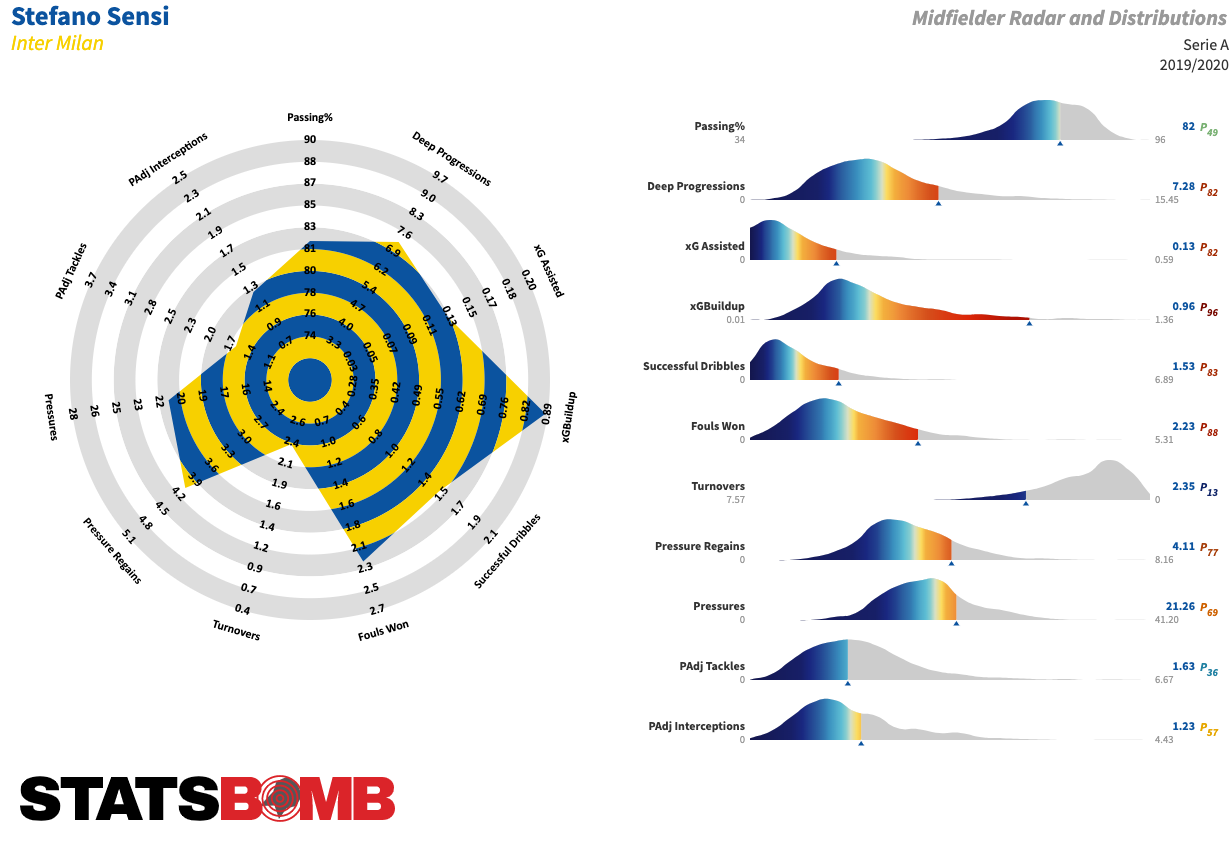 Stefano Sensi was the best Nerazzurri player at the beginning of the season, and had the highest values in xG buildup (0.96) and xG chain (1.04); however, he's been out with injury. Eriksen, an elite Premier League playmaker during his years at Tottenham, could be an upgrade over Sensi, but he must immediately step into his new role in the league as well as Europe. Together with Lazio, Inter are in a position that hardly any teams have enjoyed in the recent seasons of Juventus' domination. They have a shot at the title and must keep fighting for it until the last match of the season. But to keep fighting they need to improve. And to improve quickly.
Stefano Sensi was the best Nerazzurri player at the beginning of the season, and had the highest values in xG buildup (0.96) and xG chain (1.04); however, he's been out with injury. Eriksen, an elite Premier League playmaker during his years at Tottenham, could be an upgrade over Sensi, but he must immediately step into his new role in the league as well as Europe. Together with Lazio, Inter are in a position that hardly any teams have enjoyed in the recent seasons of Juventus' domination. They have a shot at the title and must keep fighting for it until the last match of the season. But to keep fighting they need to improve. And to improve quickly.